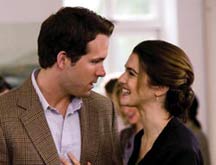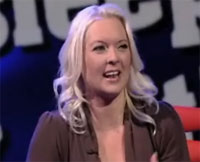 I finally saw “Definitely, Maybe,” starring Ryan Reynolds as a just-divorced and lonely Dad (who turns out to be a great romantic lead) and the ever-adorable Abigail Breslin as his daughter who longs to fix his broken love life. It’s actually a really sweet romance that manages to not get syrupy in the process.
I finally saw “Definitely, Maybe,” starring Ryan Reynolds as a just-divorced and lonely Dad (who turns out to be a great romantic lead) and the ever-adorable Abigail Breslin as his daughter who longs to fix his broken love life. It’s actually a really sweet romance that manages to not get syrupy in the process.
But seeing this particular film, coupled with my chance Netflixing last week of “Catch and Release” (starring Jennifer Garner as an almost-widow, whose fiance dies just before their wedding day), and the recent popularity of the movie-that-I-hated but that everyone else seemed to like, “P.S. I Love You” (starring Hilary Swank, also as a widow, who spends the entire film mooning over her late husband), I got to thinking about the “second chance, starting over” themes in romantic movies lately.
Starting over–having an almost out of body, out of time religious epiphany that has a born again kind of effect once a person returns to “real life”–is nothing new in the movies. The classics of this genre are most notably “It’s a Wonderful Life” and “Scrooge,” which most of us see either in on a stage if not rerun on television at some point each holiday season. The basic storyline: Man doesn’t value all he has–is so focused on or broken by work that he is missing out on the good things in life–so he must see the light and change.
But this recent trend in movies like “Definitely, Maybe” has to do with reckoning with the brokenness left behind by love lost, love taken, or love messed-up, and then “coming back” ready, “born again” if you will, for the new life that new love offers. What’s prompting this sort of romantic redemption flick? Is it the high rate of divorce in this country? Does it speak to a typically unacknowledged fantasy of getting to start over without the stigma of divorce (as with “P.S. I Love You” and “Catch and Release”)? Just noticing a trend and wondering about it …
Regardless, “Definitely, Maybe” is worth seeing.


